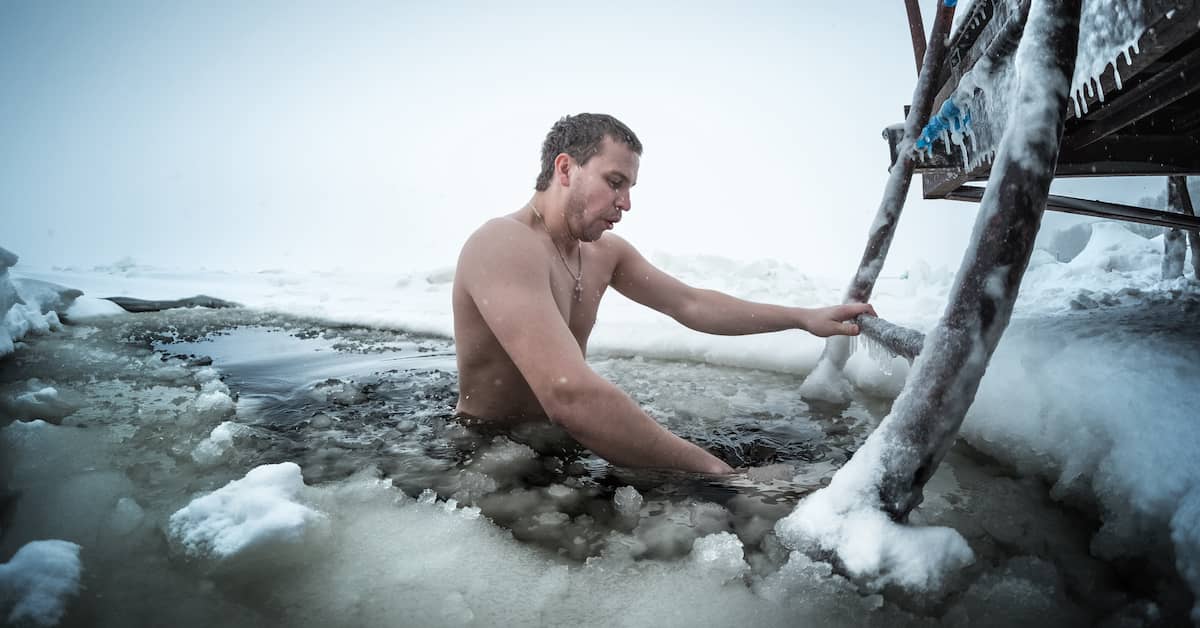
Every wintertime people in cold weather climates take a “polar bear plunge” into an iced-over lake or river. Some might call it a test of physical strength while others might say it’s crazy. But this tradition is more than a wintertime fad.
Medical researchers are discovering that cold-water dips can indeed provide substantial health benefits. These include things like improvements in insulin sensitivity and keeping brain tissue healthier as you age.1,2
While it may seem like just a fad, swimming in cold water is a tradition for improving health that goes back thousands of years.
In ancient Greece, the father of medicine, Hippocrates, recommended chilly immersions to improve personal energy.3 About 200 years ago, Thomas Jefferson would stick his feet in icy water every morning for most of his life to “maintain his good health.”4 And more recently, the late movie star Katherine Hepburn would swim in her ice-cold lake to keep from catching a cold and to maintain robust good health. (She did—she lived to the ripe old age of 96.)
So, how does cold-water swimming help the body?
Reduces The Risk Of Dementia
Tests at the University of Cambridge show that being submerged in cold water stimulates the release of a “cold shock” protein called RBM3.
This protein helps to protect the integrity of the synapses between neurons in the brain– connections that enable the neurons to communicate with each other.5 These are some of the very same connections that stop working in people with dementia, Alzheimer’s and other neurological conditions.
Cold-water swimming can also improve mood.
Diving Out Of Depression
When researchers in Italy examined the effects of cold-water swimming on people new to the practice, they found that after ten weeks of supervised instruction in cold-water bathing, the novice swimmers reported much better moods and significant increases in overall feelings of well-being.6
The Italian scientists also noted that although the swimmers in their study say it was daunting and stressful at first to get started swimming in cold water, by the end of the ten weeks the bathers found the experiences “invigorating,” “enjoyable,” “confidence building” and “life affirming.”
Other studies support the reality of these benefits. In fact, researchers in England have published a case history of a woman in her twenties who had suffered for years from protracted depression and anxiety, who had not been helped by medication or sessions with therapists. But after she enlisted a swimming coach to help her with cold-water swimming, she found that the dips into icy water enabled her to emerge from her depression and stop taking pharmaceuticals. At the time the study was published, she was still maintaining her swimming sessions and had been medication-free and symptom-free for a year.7
How The Body Responds To Ice-Cold Water
In the past few years, a wide range of other health benefits have emerged from investigations into the effects of being submerged in chilly water. For example, cold-water swimming can:
- Nullify chronic pain: A case study by researchers in England found that cold-water swimming alleviates persistent pain that isn’t successfully treated with medication. In this case, the researchers say, long-lasting pain after surgery disappeared in a patient after a cold-water dip. The researchers conclude: “Immediate, complete and sustained remission of postoperative intercostal neuralgia (occurred) after the patient engaged in an open-water swim in markedly cold conditions.”8
- Lower the risk of heart disease: Research in Europe found that cold-water swimming reduces biomarkers that signify potential cardiovascular problems. Particularly striking in this test was a sharp drop in homocysteine, an amino acid that has long been considered an independent indicator of heart disease risk.9
- Reduce your risk for diabetes: An investigation by researchers in Poland shows that repeated cold-water dips can improve insulin sensitivity and may improve metabolism in ways that could lower the chances of diabetes.10
Be Careful When You Try Out Cold Water Swimming
According to Heather Massey, PhD, who is with Portsmouth University's Extreme Environments Laboratory, there are cautions to keep in mind when you go cold-water swimming. These include to:
- Avoid cold-water swimming if you’re not in good health and already physically fit. If you have any doubts, check with your healthcare provider.
- Take part in group swims with people who are experienced cold-water swimmers. Don’t swim alone.
- Keep your swims brief and don’t stay in the water too long. Get out of the water if you start to feel too cold.
- Change your clothes immediately after exiting the water. Don extra layers of dry, warm clothing as quickly as you can – including gloves and a hat.
- Move around a lot after the swim. Expect to shiver after you climb out of the water – shivering helps the body heat itself.
- Avoid a rush to take a hot bath or shower. Doing that too soon could cause a large drop in blood pressure and cause you to faint.
But Can’t You Get Sick From Cold-Water Swims?
Even though many of us have been warned about getting sick if we “catch cold,” researchers have also found evidence that cold water swimming can support better functioning of the immune system. For one thing, it increases the body’s production of antioxidant compounds that can keep us healthier.11
But I must confess that I don’t think cold-water swimming is something I’m going to indulge in. Still, if you’re up for it, there are many good reasons to give it a try.
- https://pubmed.ncbi.nlm.nih.gov/26966319/
- https://pubmed.ncbi.nlm.nih.gov/28238655/
- Knechtle, B., et al. Cold-water Swimming: Benefits and Risks, a Narrative. Int. J. Environ. Res. Public Health 2020, 17(23), 8984; https://www.mdpi.com/1660-4601/17/23/8984
- https://physoc.onlinelibrary.wiley.com/doi/full/10.1113/EP086283
- https://pubmed.ncbi.nlm.nih.gov/28238655/
- https://onlinelibrary.wiley.com/doi/10.1002/lim2.12
- https://www.ncbi.nlm.nih.gov/pmc/articles/PMC6112379/
- https://casereports.bmj.com/content/2018/bcr-2017-222236?sid=b5194b99-031f-4930-954b-af4f2b652239
- https://www.ahajournals.org/doi/10.1161/01.RES.0000243583.39694.1f
- https://pubmed.ncbi.nlm.nih.gov/27376416/#:~:text=Results%3A Repeated cold water baths,r %3D 0.868%2C respectively
- https://pubmed.ncbi.nlm.nih.gov/23514015/
